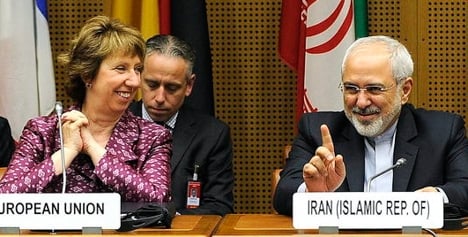Such an accord could not only consign to history one of the 21st century's most intractable geopolitical conundrums by easing fears once and for all that Iran might build a nuclear bomb.
It could also silence talk of war, put Iran and the West on the road to normalised relations after 35 years in the deep freeze and give US President Barack Obama a rare foreign policy success.
Hardliners in both the United States and Iran are putting their negotiators under pressure not to give too much away, however, and it is far from certain that a deal can be done.
"There's still a big gap. We may not be able to get there," Obama warned last Sunday.
A nuclear deal between Iran and world powers is possible if the other side refrains from "excessive demands," Iranian Foreign Minister Mohammad Javad Zarif said Tuesday as he arrived for a final round of talks.
"A deal is still possible," Zarif was quoted by Iranian media as saying.
"If, because of excessive demands by the other side, we don't get a result then the world will understand that the Islamic Republic sought a solution, a compromise and a constructive agreement and that it will not renounce its rights and the greatness of the nation."
Iran's arch foe Israel, widely assumed to have a formidable nuclear arsenal itself, is also watching closely, as are Sunni Gulf monarchies uneasy about any US rapprochement with Shiite Iran.
The United States, China, Russia, Britain, France and Germany (the P5+1) want Iran to scale down its nuclear programme to make it virtually impossible for Iran to assemble an atomic bomb.
Iran, which says its nuclear aims are exclusively peaceful, wants painful sanctions lifted and a recognition of its "right" to a peaceful nuclear programme.
On November 24 last year, after moderate Hassan Rouhani became president, Iran and the P5+1 secured an interim agreement.
However, they missed a July 20 deadline to reach a comprehensive accord, giving themselves four more months, which expires this coming Monday.
US Secretary of State John Kerry, due back in Vienna later this week, said at the time that the talks were "the best chance we've ever had to resolve this issue peacefully".
And now, says chief US negotiator Wendy Sherman, it is "time to finish the job".
Give and take
Some areas in what would be a highly complex agreement appear provisionally sewn up, like altering a reactor being built at Arak, a different use for the Fordo facility — under a mountain to protect it from air attack — and more inspections.
But the big problem remains enrichment, which renders uranium suitable for power generation and making nuclear medicines — but also, at high purities, for a weapon.
Iran wants to ramp up massively the number of enrichment centrifuges in order, it says, to make reactor fuel. The West wants them slashed, saying Iran has no such need at present.
Other thorny issues are the duration of the accord and the pace at which sanctions are lifted, an area where Iranian expectations are "excessive", one Western diplomat said.
"They want everything, all at once and this is not realistic," the diplomat involved in the talks said.
Another extension?
Given the differences many analysts expect another extension.
"There is virtually no possibility that a complete deal will be concluded by November 24," former top US diplomat on non-proliferation Robert Einhorn, now an expert with the Brookings Institution, told AFP.
"I think they'll agree to extend the interim arrangements for several more months."
And the alternative — walking away — would be "catastrophic," Arms Control Association analyst Kelsey Davenport said.
"Given the political capital that both sides have invested … it would be foolish to walk away from the talks and throw away this historic opportunity," Davenport told AFP.
For now though, officials insist that they remain focused on the deadline.
"An extension is not and has not been a subject of conversation at this point," a senior US official said late Monday.
And another extension also carries risks, not least increasing the likelihood of Republicans pushing for fresh US sanctions, something which could prompt Iran to walk away.



 Please whitelist us to continue reading.
Please whitelist us to continue reading.
Member comments